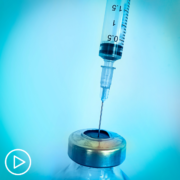Chronic Lymphocytic Leukemia (CLL) Defined
Chronic Lymphocytic Leukemia (CLL) Defined from Patient Empowerment Network on Vimeo.
What is CLL? Dr. Brian Hill defines chronic lymphocytic leukemia (CLL) and explains how it differs from small lymphocytic lymphoma (SLL).
Dr. Brian Hill is the Director of the Lymphoid Malignancies Program at Cleveland Clinic. More about this expert.
See More From the Path to CLL Empowerment
Related Resources

|

|

|
Transcript:
Dr. Brian Hill:
So, chronic lymphocytic leukemia is a term that refers to a cancerous condition in which the abnormal or cancerous white blood cells are a type of B-cells with certain characteristics that are present above a certain threshold in the blood. Those same cancer cells can also grow and divide and set up shop in other organs besides the blood and bone marrow.
And that can be a lymph node, spleen and sometimes we find the exact same type of cell in a lymph node or other parts of the body. And we don’t find it in large quantities enough in the blood. And when that happens, we call it small lymphocytic lymphoma or SLL. So, people get very confused by the terminology, “Do I have leukemia, or do I have lymphoma.” And so, a lot of times there’s a reference to a condition called CLL-SLL. CLL-SLL really is one disease.
And the term leukemia or lymphoma really just refers to where is the predominant location for the abnormal cancer B-cells. Are they in the blood or are they in the tissue?
If it’s in the blood, mostly above 5,000 cells per microliter, that’s the cut off. If it’s in the blood predominantly, it’s CLL. But if those same cells are in the lymph nodes or the spleen but not above that threshold of 5,000 in the blood, then the term is small lymphocytic lymphoma. And often times that diagnosis made from a tissue biopsy or a lymph node biopsy rather through a blood test or a bone marrow biopsy. Really, these are the same disease. And even physicians who don’t practice in this area get confused about it.
And it’s important to know that they can be treated exactly the same and are interchangeable. Rarely I’ve seen a mistake be made that someone who has a diagnosis of SLL or small lymphocytic lymphoma is treated with the types of chemotherapy drugs that we would typically use for indolent forms of lymphoma.
And some of those therapies overlap. So, there are biologic similarities and clinical similarities between B-cell lymphomas and CLL-SLL for sure. But there is a lot of nuance in B-cell lymphomas, and not every single treatment that works really well for B-cell lymphoma should be used in CLL or SLL.










